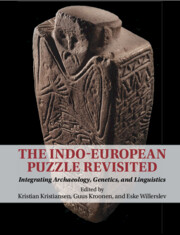Book contents
- The Indo-European Puzzle Revisited
- The Indo-European Puzzle Revisited
- Copyright page
- Contents
- Figures
- Tables
- Contributors
- Preface
- Introduction
- Part I Early Indo-European and the Origin of Pastoralism
- Part II Migratory Processes and Linguistic Dispersals between Yamnaya and the Corded Ware
- Part III The Cultural and Linguistic Significance of Bell Beakers along the Atlantic Fringe
- 9 From the Steppe to Ireland: The Impact of aDNA Research
- 10 Beaker Culture Metal and Mobility in Atlantic Europe: Some Implications for Genetic and Language Origins
- 11 “From the Ends of the Earth”: A Cross-Disciplinary Approach to Long-Distance Contact in Bronze Age Atlantic Europe
- 12 With the Back to the Ocean: The Celtic Maritime Vocabulary
- 13 European Prehistory between Celtic and Germanic: The Celto-Germanic Isoglosses Revisited
- Part IV The Bronze Age Chariot and Wool Horizons
- Part V Kinship Systems, Marriage, Fosterage, Free, and Unfree
- Concluding Reflections
- Index
- References
12 - With the Back to the Ocean: The Celtic Maritime Vocabulary
from Part III - The Cultural and Linguistic Significance of Bell Beakers along the Atlantic Fringe
Published online by Cambridge University Press: 29 April 2023
- The Indo-European Puzzle Revisited
- The Indo-European Puzzle Revisited
- Copyright page
- Contents
- Figures
- Tables
- Contributors
- Preface
- Introduction
- Part I Early Indo-European and the Origin of Pastoralism
- Part II Migratory Processes and Linguistic Dispersals between Yamnaya and the Corded Ware
- Part III The Cultural and Linguistic Significance of Bell Beakers along the Atlantic Fringe
- 9 From the Steppe to Ireland: The Impact of aDNA Research
- 10 Beaker Culture Metal and Mobility in Atlantic Europe: Some Implications for Genetic and Language Origins
- 11 “From the Ends of the Earth”: A Cross-Disciplinary Approach to Long-Distance Contact in Bronze Age Atlantic Europe
- 12 With the Back to the Ocean: The Celtic Maritime Vocabulary
- 13 European Prehistory between Celtic and Germanic: The Celto-Germanic Isoglosses Revisited
- Part IV The Bronze Age Chariot and Wool Horizons
- Part V Kinship Systems, Marriage, Fosterage, Free, and Unfree
- Concluding Reflections
- Index
- References
Summary
The aim of this chapter is to establish the semantic field of maritime vocabulary of the Celtic languages, especially that part of the maritime vocabulary that can be reconstructed for Proto-Celtic, the common ancestor of all Celtic languages, and for the prehistoric stages of the Insular Celtic languages. The approach taken in this study is to analyse the relevant lexemes etymologically, and to assess the findings from the point of view of linguistic archaeology. Linguistic archaeology seeks to extract as much information as possible from the synchronic and diachronically reconstructable semantics and morphology of words in order to make inferences about the environment and living conditions of the language’s speakers from a prehistoric and early historic perspective. Maritime vocabulary, which is the focus of this study, includes all elements of the lexicon that refer to the topographical, biological, and economic environment of the sea and the shore, and to human interaction with them.
- Type
- Chapter
- Information
- The Indo-European Puzzle RevisitedIntegrating Archaeology, Genetics, and Linguistics, pp. 172 - 192Publisher: Cambridge University PressPrint publication year: 2023
References
- 1
- Cited by

